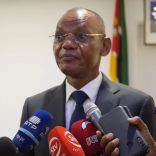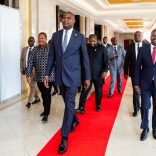Zimbabwe begins inventory of historical sites in Mozambique
Mozambique: Mondlane supports IL’s vote against Portuguese president’s visit

File photo: Screen grab/Venâncio Mondlane Facebook
Mozambican politician Venâncio Mondlane said on Thursday that the IL’s vote in Portugal’s parliament against the Portuguese President’s visit to Mozambique is “the highest manifestation of consistency”, describing the visit as the legitimisation of an “illegitimate government”.
“I think that what the Liberal Initiative is doing is demonstrating consistency at the highest level (…) One should recognise that the IL’s vote against Marcelo’s visit reflects a respectful, considered assessment of the historical and symbolic value of independence (…) The fundamental issue is that they understand that the visit of the Portuguese Head of State to Mozambique is a way of legitimising a government that came to power and maintains it illegitimately, based on the force of arms,” Venâncio Mondlane responded to a question posed by Lusa, on the sidelines of the conference of the non-governmental organisation Centro de Integridade Pública (CIP).
On Wednesday, the Portuguese parliament approved the trip by President Marcelo Rebelo de Sousa to Mozambique for the celebrations of the 50th anniversary of the country’s independence on 25 June, with the IL voting against the measure.
At the end of the plenary vote, MP Rodrigo Saraiva justified the IL’s vote because the Mozambican regime still displays the “repressive and anti-democratic nature” that has characterised it since Daniel Chapo came to power, while stressing that his party welcomes the 50th anniversary of Mozambique’s independence.
For the former Mozambican presidential candidate, who led the post-election demonstrations in Mozambique, the position of that Portuguese political force is legitimate, especially given the “serious human rights violations” that occurred in Mozambique during the protests and the need to hold those responsible accountable.
“It is on this basis that they maintain that participating in independence would be legitimising the continued enslavement of a people, humiliation, injustice and an authoritarian regime,” he stressed.
Despite this position, Mondlane expressed his openness to a meeting with Marcelo during his visit to Mozambique, recalling the meeting they had on 24 July last year in Lisbon.
“I have already had a conversation with Marcelo, and he received me in a very cordial and friendly manner. We had planned to meet in his office. Still, he preferred, during my pre-campaign, (…) to receive me at his favourite restaurant for lunch (…). I am comfortable with that (…). One thing is political positioning. Another is the human side of cordiality and hospitality,” Mondlane said.
Mondlane, who rejects the results of the 9 October elections, has led the most contested election results the country has seen since the first multiparty elections (1994), with protests in which around 400 people have lost their lives in clashes with security forces in clashes with the police, according to data from civil society organisations. This situation also degenerated into looting and destruction of businesses and public infrastructure.
In February this year, parliament passed a resolution recommending that the government “publicly condemn the violent repression of peaceful demonstrators” in Mozambique; it retained the request to recognise the election results.
In the final overall vote, only the PCP opposed this draft resolution, and all the other parties represented in parliament approved it.
On 15 January this year, after Daniel Chapo took office as president of Mozambique, an event Marcelo Rebelo de Sousa joined remotely, Marcelo Rebelo de Sousa sent a message to the new Mozambican head of state expressing “reinforced commitment” to cooperation between the two countries.
In his letter to Daniel Chapo, the Portuguese president said he hoped that the “legitimate aspirations of various political and social sectors” in Mozambique would be realised, with “the safeguarding of pluralism and inclusive community dialogue”.
The inauguration ceremony of Daniel Chapo as president of Mozambique featured Portugal’s representation through the foreign minister, Paulo Rangel.
Mozambique was the destination chosen by the Portuguese president for his first state visit in May 2016. In January 2020, Marcelo Rebelo de Sousa attended the inauguration of Filipe Nyusi after his re-election.
In 2023, Marcelo Rebelo de Sousa expressed his willingness to participate in the independence celebrations of the Portuguese-speaking countries that were former colonies of Portugal, if invited, and announced that he would like to see the heads of state of those countries celebrate the 50th anniversary of 25 April 1974 in Portugal, and the event has been confirmed.
The Constitution imposes a formality: the parliament must approve the head of state’s trips, and it stipulates that the president may leave the national territory only after parliament authorises the journey.












Leave a Reply
Be the First to Comment!
You must be logged in to post a comment.
You must be logged in to post a comment.